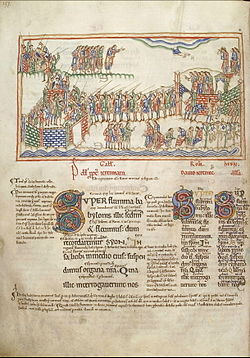| Psalm 137 | |
|---|---|
| "By the rivers of Babylon, there we sat down" | |
| Communal lament | |
 Psalm 137 from Chludov Psalter (9th century) | |
| Other name |
|
| Language | Hebrew (original) |
| Psalm 137 | |
|---|---|
 Psalm 137 in the Eadwine Psalter (12th century) | |
| Book | Book of Psalms |
| Hebrew Bible part | Ketuvim |
| Order in the Hebrew part | 1 |
| Category | Sifrei Emet |
| Christian Bible part | Old Testament |
| Order in the Christian part | 19 |
Psalm 137 is the 137th psalm of the Book of Psalms, beginning in English in the King James Version: "By the rivers of Babylon, there we sat down". The Book of Psalms is part of the third section of the Hebrew Bible, and a book of the Christian Old Testament. In the slightly different numbering system used in the Greek Septuagint and Latin Vulgate translations of the Bible, this psalm is Psalm 136. In Latin, it is known by the incipit, "Super flumina Babylonis". [1] The psalm is a communal lament about remembering Zion, and yearning for Jerusalem while dwelling in exile during the Babylonian captivity.
Contents
- Context and content
- Verses 1–4
- Verses 5–6
- Verses 7–9
- Liturgical uses
- Judaism
- Eastern Orthodox Church
- Coptic Orthodox Church
- Western Christianity
- Translations, versifications and settings
- 16th to 18th centuries
- 19th century
- 20th and 21st centuries
- In literature
- Historical instances of use
- Text
- Notes
- References
- Bibliography
- External links
The psalm forms a regular part of liturgy in Jewish, Eastern Orthodox, Catholic, Lutheran, Anglican and other Protestant traditions. It has often been set to music and paraphrased in hymns.








